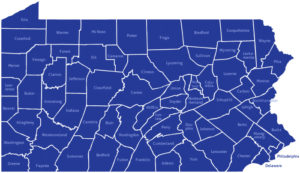PA Health Policy Update for the Week of November 29-December 3
The following is an update of selected state health policy developments in Pennsylvania for the week of November 29 to December 3, 2021. (Some of the language used below is taken directly from state documents.)
Governor Wolf
 Governor Wolf has announced a plan to spend approximately $1.2 billion in American Rescue Plan Act federal funding to support Medicaid’s home and community-based services (HCBS) system, giving more Pennsylvanians access to critical services in their communities. This temporary funding enhancement will be directed toward Medicaid-funded essential care services to seniors, adults with intellectual and physical disabilities, adults with behavioral health needs such as substance use disorder or mental illness, and children with chronic complex medical needs. The American Rescue Plan Act provides states with a temporary, one-year, 10 percent increase in the rate at which the federal government matches state spending for certain Medicaid-covered home and community-based services. To learn more about how Pennsylvania plans to spend this money, see this Wolf administration news release. For more on Pennsylvania’s plan, go here. A week after this announcement, the federal government approved the state’s plan for using this money, as the Department of Human Services reported to stakeholders.
Governor Wolf has announced a plan to spend approximately $1.2 billion in American Rescue Plan Act federal funding to support Medicaid’s home and community-based services (HCBS) system, giving more Pennsylvanians access to critical services in their communities. This temporary funding enhancement will be directed toward Medicaid-funded essential care services to seniors, adults with intellectual and physical disabilities, adults with behavioral health needs such as substance use disorder or mental illness, and children with chronic complex medical needs. The American Rescue Plan Act provides states with a temporary, one-year, 10 percent increase in the rate at which the federal government matches state spending for certain Medicaid-covered home and community-based services. To learn more about how Pennsylvania plans to spend this money, see this Wolf administration news release. For more on Pennsylvania’s plan, go here. A week after this announcement, the federal government approved the state’s plan for using this money, as the Department of Human Services reported to stakeholders.
General Assembly
The House Republican Policy Committee held a hearing this week examining the health care staffing crisis. Representatives from the Hospital & Healthsystem Association of Pennsylvania (HAP), Penn State Health, Geisinger, the Pennsylvania Health Care Association (PHCA), SEIU Healthcare, and the Pennsylvania State Nurses Association testified. Hearing testimony and a video recording may be viewed here.
Two members of the General Assembly – House majority leader Kerry Benninghoff (R-Mifflin) and Representative Mark Gillen (R-Berks) – have tested positive for COVID-19.
 State Revenue Update
State Revenue Update
Revenue collections continue to exceed estimates. The Department of Revenue reported this week that Pennsylvania collected $6.6 billion in General Fund revenue in November, which was $217.9 million, or 3.4 percent, more than anticipated. For the year to date Pennsylvania has collected $18.7 billion in General Fund revenue, which is $1.0 billion, or 5.7 percent, above estimate.
Department of Human Services
The Department of Human Services (DHS) has published a notice in the Pennsylvania Bulletin explaining that it intends to allocate $106.130 million in total funds for disproportionate share hospital payments (Medicaid DSH payments) to qualifying acute-care general hospitals that provide enhanced access to multiple types of medical care in economically distressed areas of the state and $88.994 million in total funds for supplemental payments to qualifying acute-care general hospitals that treat a high volume of opioid use disorder patients in their emergency rooms. Go here to see the Pennsylvania Bulletin notice.
DHS has issued a Medical Assistance Bulletin updating its dental fee schedule. The update is effective as of August 23, 2021.
Department of Health
The state Supreme Court has temporarily restored the Department of Health’s (DOH) order requiring students, teachers, and staff to wear masks in Pennsylvania school districts. Read the court’s ruling here. The ruling only put a hold on Commonwealth Court’s decision to issue a stay of the order; the Supreme Court will still need to consider the governor’s appeal of the Commonwealth Court decision.
DOH has established new walk-in COVID-19 testing sites in Berks, Centre, Clinton, Crawford, Jefferson, and Susquehanna counties. Learn more from this news release.
COVID-19: By the Numbers
- Daily COVID-19 case counts are on the rise in Pennsylvania. Wednesday’s 7606 new cases and Thursday’s 9143 new cases are the highest single-day totals in the state since the second week of January. To date, more than 1.75 million Pennsylvanians have contracted COVID-19.
- The number of new COVID-19-related deaths remains high. To date, more than 33,000 Pennsylvanians have died from COVID-19.
- All 67 Pennsylvania counties continue to experience a high rate of COVID-19 transmission.
- The number of Pennsylvanians hospitalized because of COVID-19, in hospital ICUs because of COVID-19, and on ventilators because of the virus, all of which declined during the first two weeks of November, rose significantly during the last two weeks of the month. As the month came to a close, COVID-19 related hospitalizations were up 43 percent over the beginning of the month, ventilator cases were up 32 percent, and COVID-19 patients in hospital ICUs also were up 32 percent.
- 231,000 Pennsylvanians were recorded as completing a vaccine regimen during the month of November.
 Department of Drug and Alcohol Programs
Department of Drug and Alcohol Programs
The Department of Drug and Alcohol Programs released Policy Bulletin 21-05, which documents modifications to the Standard General Terms & Conditions, Fiscal and Operations Manual, and Substance Abuse Prevention and Treatment Block Grant (SAPTBG) provisions.
Stakeholder Events
Medical Assistance Advisory Committee – Consumer Subcommittee – December 8
The Medical Assistance Advisory Committee’s consumer subcommittee will meet virtually on Wednesday, December 8 at 1:00 p.m. Go here to register to participate.
Medical Assistance Advisory Committee – December 9
The Medical Assistance Advisory Committee will meet virtually on Thursday, December 9 at 10:00 a.m. Go here to register for the web event.
Patient Safety Authority – December 9
The Patient Safety Authority will hold a virtual public meeting of its board on Thursday, December 9, 2021, at 1 p.m. Go here for information about registering and participating.
 Governor Wolf
Governor Wolf Pennsylvania Health Care Cost Containment Council (PHC4)
Pennsylvania Health Care Cost Containment Council (PHC4) General Assembly
General Assembly COVID-19: By the Numbers
COVID-19: By the Numbers Stakeholder Events
Stakeholder Events

 Department of Health
Department of Health Around the State
Around the State The Wolf administration has directed vaccine providers to support COVID-19 vaccination clinics and has introduced a free COVID-19 testing program for schools across the state. Learn more from
The Wolf administration has directed vaccine providers to support COVID-19 vaccination clinics and has introduced a free COVID-19 testing program for schools across the state. Learn more from  Department of State
Department of State  General Assembly
General Assembly Department of Human Services
Department of Human Services State-Wide Mask Mandate
State-Wide Mask Mandate